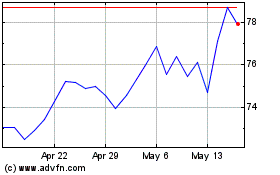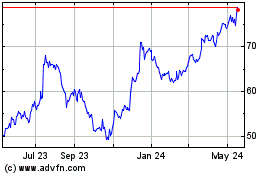The Schwab Center for Financial Research (SCFR), which provides
top-quality research, timely market insights and practical guidance
for investors, today released its annual market outlook, Schwab
Market Perspective: 2025 Outlook, which highlights the most
important economic and market trends that investors should consider
for the year ahead.
The Schwab Market Perspective: 2025 Outlook provides
perspectives on U.S. stocks and the U.S. economy, fixed income,
corporate bonds, municipal bonds, and a global outlook. SCFR also
released its 2025 Planning and Wealth Management Outlook, which
provides guidance on how to stay on track in 2025 to help reach
your financial goals.
2025 U.S. Stocks and Economy
Outlook
“There will likely be myriad
economic crosscurrents at play in 2025, stemming from uncertainty
around tariff, immigration, and tax policies. On the pro-growth
side, the prospect of less-stringent regulations and lower taxes
are at odds with the prospect of aggressive hikes in tariffs on
imported goods and a major reduction in the labor force. For U.S.
equities, the upside is that momentum and breadth are strong
heading into the new year; but that doesn’t rule out more
volatility at the index level, which we think is much more likely
given the increased likelihood of stickier inflation and more
wobbles in the labor market.”
Liz Ann Sonders, Chief Investment
Strategist, and Kevin Gordon, Senior Investment Strategist, Charles
Schwab & Co., Inc.
2025 Fixed Income
Outlook
“It looks like another bumpy ride
is in store for fixed income investors in 2025, with a wide range
of potential outcomes. The bond market is caught between the
Federal Reserve's plans to cut interest rates, and the risks to
higher inflation and debt levels in 2025 from potential policy
decisions made in Washington D.C. We are taking a cautious approach
to duration and credit risk but recognize that periods of high
volatility and rising yields can provide an opportunity for
investors looking to capture more income over the long run.”
Kathy Jones, Chief Fixed Income
Strategist, Charles Schwab & Co., Inc.
2025 Corporate Bond
Outlook
“Our 2025 corporate bond outlook
in a nutshell: Strong fundamentals, rich valuations. Like the
resilient economy, corporations generally remain strong as profits
grow and cash balances rise. That's been a key driver of the
outperformance so far this year, as falling credit spreads have
pulled up corporate bond prices relative to Treasuries. That
performance will be tough to replicate because spreads are so
tight, but we still have a favorable view on corporate bond
investments given the strong economic backdrop.”
Collin Martin, Fixed Income
Strategist, Charles Schwab & Co., Inc.
2025 Municipal Bond
Outlook
“We expect the muni market to be
characterized by a tale of two half-years in 2025. Changes to tax
policy will likely dominate the first half of the year and then
munis should adjust over the second half of the year. We're
cautious about longer-term bonds and lower-rated issuers going into
2025. The outcome of the election has raised the probability that
inflation and yields move higher. Credit conditions for most
issuers are favorable and many issuers are entering 2025 with
strong reserves that they can tap into if there's a slowdown in
revenues.”
Cooper Howard, Fixed Income
Strategist, Charles Schwab & Co., Inc.
2025 Global Outlook
“2025 may bring hurdles for
stocks in the form of uncertain trade policy, tighter fiscal
policy, and slower than average growth in the global economy and
corporate earnings. All these may drive volatility. But improving
growth, along with a rise in stock valuations, may support solid
returns overall for international stocks in 2025, with differing
opportunities by region.”
Jeffrey Kleintop, Chief Global
Investment Strategist, Charles Schwab & Co., Inc.
2025 Planning and Wealth
Management Outlook
“With a new administration in
Washington that could bring changes to tax policy and influence
some economic factors, 2025 will likely be a year of 'shifting
gears' for investors. Perhaps that is a gradual shift, for example,
in how investors plan for taxes and manage concerns about
inflation. As a result, it’s our view that some investors may
choose to make small adjustments to their wealth management plans
in 2025, but in general, investors should keep in mind that the
most effective plans take the long view.”
Rob Williams, Managing Director
of Financial Planning, Retirement Income, and Wealth Management,
Charles Schwab & Co., Inc.
Learn more about the Schwab Center for Financial Research’s 2025
Market Outlook here and 2025 Planning and Wealth Management Outlook
here.
About Charles Schwab
At Charles Schwab we believe in the power of investing to help
individuals create a better tomorrow. We have a history of
challenging the status quo in our industry, innovating in ways that
benefit investors and the advisors and employers who serve them,
and championing our clients’ goals with passion and integrity.
More information is available at www.aboutschwab.com. Follow us
on Twitter/X, Facebook, and LinkedIn.
Disclosures:
The information here is for general informational purposes only
and should not be considered an individualized recommendation or
personalized investment advice. The type of securities and
investment strategies mentioned may not be suitable for everyone.
Each investor needs to review a security transaction for his or her
own particular situation.
Past performance is no guarantee of future results and the
opinions presented cannot be viewed as an indicator of future
performance.
Investing involves risk, including loss of principal.
International investments involve additional risks, which include
differences in financial accounting standards, currency
fluctuations, geopolitical risk, foreign taxes and regulations, and
the potential for illiquid markets. Investing in emerging markets
may accentuate these risks.
Fixed income securities are subject to increased loss of
principal during periods of rising interest rates. Fixed income
investments are subject to various other risks including changes in
credit quality, market valuations, liquidity, prepayments, early
redemption, corporate events, tax ramifications, and other factors.
Lower rated securities are subject to greater credit risk, default
risk, and liquidity risk.
Tax-exempt bonds are not necessarily a suitable investment for
all persons. Information related to a security's tax-exempt status
(federal and in-state) is obtained from third parties, and Charles
Schwab & Co., Inc. does not guarantee its accuracy. Tax-exempt
income may be subject to the Alternative Minimum Tax (AMT). Capital
appreciation from bond funds and discounted bonds may be subject to
state or local taxes. Capital gains are not exempt from federal
income tax.
The policy analysis provided by the Charles Schwab & Co.,
Inc., does not constitute and should not be interpreted as an
endorsement of any political party.
Diversification and asset allocation strategies do not ensure a
profit and cannot protect against losses in a declining market.
Forecasts contained herein are for illustrative purposes only,
may be based upon proprietary research and are developed through
analysis of historical public data.
All expressions of opinion are subject to change without notice
in reaction to shifting market conditions.
The information and content provided herein is general in nature
and is for informational purposes only. It is not intended, and
should not be construed, as a specific recommendation,
individualized tax, legal, or investment advice. Tax laws are
subject to change, either prospectively or retroactively. Where
specific advice is necessary or appropriate, individuals should
contact their own professional tax and investment advisors or other
professionals (CPA, Financial Planner, Investment Manager) to help
answer questions about specific situations or needs prior to taking
any action based upon this information.
The Schwab Center for Financial Research is a division of
Charles Schwab & Co., Inc.
The Charles Schwab Corporation provides a full range of
brokerage, banking and financial advisory services through its
operating subsidiaries. Its broker-dealer subsidiary, Charles
Schwab & Co. Inc. (Member SIPC), and its affiliates offer
investment services and products. Its banking subsidiary, Charles
Schwab Bank, SSB (member FDIC and an Equal Housing Lender),
provides deposit and lending services and products.
1224-B54M
View source
version on businesswire.com: https://www.businesswire.com/news/home/20241217126340/en/
Kaitlyn Campisi Charles Schwab 929-318-7957
Charles Schwab (NYSE:SCHW)
Historical Stock Chart
From Nov 2024 to Dec 2024

Charles Schwab (NYSE:SCHW)
Historical Stock Chart
From Dec 2023 to Dec 2024
